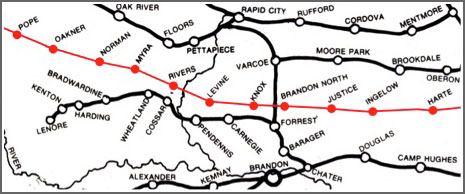|
The Grand Trunk Pacific – A
Transcontinental Dream
The busy Canadian National Railway line, which passes through Rivers,
carries both freight and passengers from coast to coast. The line
has its origins with the Grand Trunk Pacific, a wholly owned subsidiary
of the Grand Trunk Railway, which established the Town of Rivers as a
divisional point on its new line in 1908.
As the twentieth century approached, railway operations in western
Canada were under the control of the Canadian Pacific, which in 1885
had completed its cross-country line, and by the Canadian Northern,
which had begun the start of a second transcontinental. The
Municipality of Riverdale was served the Great Northwest Central
Railway Lenore Branch beginning in 1902.
The Grand Trunk Pacific Railway was established to build a line from
Winnipeg to the Pacific. It was a time of seemingly endless prosperity
and growth, and its creation was encouraged by the newly-elected
Liberal government of Sir Wilfred Laurier at the urging of Sir Charles
Rivers-Wilson, Chairman of the Grand Trunk Railway. Construction began
on the Canadian Prairies in 1905.
Because the GTP received no federal grants, it purchased forty-five
thousand acres of land for eighty-six townsites. It advertised them as
“towns made to order.”
The first mention of the new town of Rivers in the media came on July
22 when the Brandon Sun headline declared: “RIVERS WILL BE GOOD TOWN”
The article went on to report that the track had proceeded 75 miles
west from Portage and that the first divisional point would be called
Rivers. “It is expected to be quite a centre.”
Under General manager, Charles M. Hays, the company pushed its line
west. The Grand Trunk Pacific was for a relatively short time a very
influential factor in the development of Western Canada. This vital
connection to the rest of the country forever changed life in Rivers
and area.
Construction proceeded west to Saskatoon, Saskatchewan in 1907,
Edmonton, Alberta in 1909, and through Jasper, Alberta into the
Yellowhead Pass crossing the Continental Divide in 1910-1911. The last
spike ceremony heralding completion of the rail line across the
prairies, and through the Rocky Mountains to the newly constructed
seaport at Prince Rupert, British Columbia was held one mile east of
Fort Fraser, British Columbia on April 7, 1914.

The ABC Railway
In Manitoba villages with either sidings or stations were created in
alphabetical order, starting just west of Portage la Prairie with the
siding known as Arona and continuing with Bloom, Caye, Deer, Exira,
Firdale, Gregg, Harte,…
|